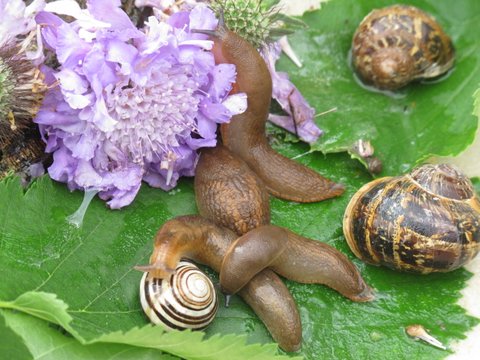
Of the many natural pests found in most gardens, few will contribute more to the gardener’s annoyance and plant losses than the destruction inflicted by slugs and snails on vulnerable garden plants. Few plants especially new plants in the herbaceous or fruit gardens will escape the munching destruction caused by these slimy creatures.
Slugs and snails do not like bright warm weather, or dry and coarse soil conditions because movement is difficult and slow making them vulnerable to attack by natural predators (birds, frogs, hedgehogs etc). During dry conditions, they are more likely to seek safe shelter often hiding under stone, wall crevices, behind wall climbers etc as they wait patiently for more favourable conditions. This does explain why slugs and snails are more commonly seen in the evening and especially after heavy rainfall when there is plenty of surface moisture which they require to facilitate easy movement and enabling them to inflict heavy damage on plants.
Although complete eradication does seem to be more aspirational than realistic, one can at least implement some simple ‘Holy Grail’ inspired practical measures in helping to greatly reduce the potential for damage caused by these after dark garden pests.
- Avoid watering plants too late in the evening
- Routinely break the soil surface in planted borders to keep it gritty
- Reduce or remove the potential for safe shelters in close proximity to vulnerable plants
- Spread a layer of coarse grit, broken egg shells or used coffee grinds around plants
- Check behind any wall climbing plants for lurking slugs or snails
Hedgehogs are voracious slug and snail predators, if possible one can try and create a sanctuary to attract a hedgehog to take up residence in the garden by simply leaving a small pile of cut timber logs in a sheltered corner.
Other methods to consider using to control slugs include, avoid plants (Hostas, Dahlias, Dianthus, Leucanthemums etc) in the garden which are vulnerable to attack. Regularly inspect planted areas during low light conditions (dusk or night patrols) aided with torch and armed with secateurs. The proceeds will make a welcome breakfast feast for the birds next day. Beer trays are also irresistible to slugs to such an extent they are happy and willing to drown enjoying the indulgence. But beer trays are conspicuous, often unsightly and prove difficult to conceal in neatly planted borders. Simply sprinkling some salt on the offending pests can also be effective means of control. Other and more costly methods include the use of slug pellets but beware that there is no potential risk to small birds.
Whatever your preferred method, regular and vigilant inspections will be essential in order to reduce the destructive potential of slugs and snails in the garden.
If you have any queries, or would like to arrange a site meeting to discuss any garden design or landscaping project you may be considering, contact Owen on 087-2306 128 or by e-mail at: info@owenchubblandscapers.com
For lots more gardening inspiration, information, advice and tips please visit our:
Website on www.owenchubblandscapers.com
Facebook: www.facebook.com/owenchubbgardenlandscapers
Pinterest: http://pinterest.com/owenchubb/





